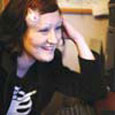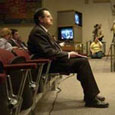Teacher Guides by Subject media literacy
Featured Resources
Featured Lesson

Growing Up Online
This Web site features lessons plans that will help students understand the history and economics of MySpace -- the who, what, when and why it was created, as well as resources to foster parent/teen engagement with online media.
Featured Activity

A Hidden Life
Learn about the guiding ethical principles of professional journalists through "Scruples: A Game of Journalists' Dilemmas." View All Lessons on media literacy
Fat
Students will learn about the causes and health implications of obesity, and explore how media and cultural ideals as well as biology and genetics influence our relationship with food. (Original airdate: Nov. 3, 1998)
From Jesus to Christ: The First Christians
Using this guide, students will study the history of Christianity and the Roman Empire, what it takes to be a "founder," the nature of oral versus written storytelling, and role of religion in society. (Original airdate: April 6, 1998)
Growing Up Online
This study guide offers teachers and parents a variety of useful resource materials to probe more deeply into the issues of growing up online. (Original airdate Jan. 22, 2008)
The Gulf War
Using this guide, students will examine the decision-making behind the 1991 Gulf War and explore media coverage of the conflict. (Original airdate: Jan. 9, 1996)
A Hidden Life
Students will explore the guiding ethical principles of professional journalists and evaluate hypothetical dilemmas to determine if a story should "go to press." (Original airdate: November 14, 2006)
In Search of Al Qaeda
Students will use this film -- a reporter's personal journey to the Middle East to understand what happened to Al Qaeda in the months after the war in Afghanistan -- to explore issues of media literacy and how public opinion was formed on both sides of the conflict. (Original airdate: Nov. 21, 2002)
Merchants of Cool
This film and guide trace the tactics, techniques, and cultural ramifications of the marketing of mass culture to teenagers. Students will develop media literacy skills by exploring corporate marketing techniques and analyzing media sources. (Original airdate: Feb. 27, 2001)
Much Ado About Something
This film and guide examine the question of whether William Shakespeare was the true author of all his work. Students will explore political and literary ramifications of the authorship question, as well as the nature of Shakespeare's language. (Original airdate: Jan. 2, 2003)
Muslims
Students will use this guide to explore the myths and stereotypes surrounding the Muslim faith and its worldwide adherents. They will also learn to analyze media sources for bias by comparing analysis of an event from both Muslim and non-Muslim sources. (Original airdate: May 9, 2002)
News War
These writing activities will familiarize students with the First Amendment, the relationship of a free press to democracy, and the reasons for and against granting journalists the right to keep sources confidential. (Original Airdate: Feb. 13, 2007)
The O.J. Verdict
Using this guide, students will explore the role of race in the Simpson jury's verdict, and in the media and contemporary society. (Original airdate: Oct. 4, 2006)
The Persuaders
This guide allows students to explore the role of advertising, marketing, and branding in both the topics they are studying and their communities. (Original airdate: November 9, 2004)
The Roots of Terror
This teacher's guide uses a series of four documentaries produced by FRONTLINE in the wake of Sept. 11 to explore the roots of terrorism and the complex evolution of U.S. policy and Islamic fundamentalism. Includes media literacy activities.
When Kids Get Life
Challenges students to understand the power of the media to shape public opinion about the justice or injustice of criminal laws. (Original Airdate: May 8, 2007)
Who Was Lee Harvey Oswald?
Using this guide, students will explore the character and motivations of President Kennedy's assassin. They will learn about how conspiracy theories are formed by thinking about a country's search for meaning behind a national trauma, and also examining how authors and filmmakers express "truth" using facts and/or fiction.
| 
